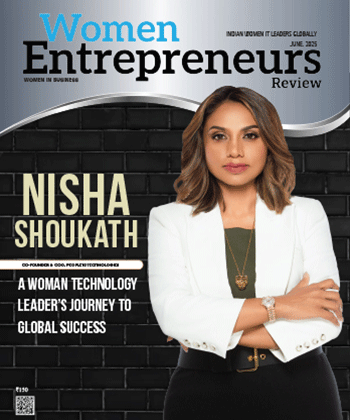
Manufacturers Must Adopt Holistic & Strategic Approach to Digital Transformation
By: Mehjabeen Taj Aalam, CDIO, Raychem RPG (P) Ltd.
Mehjabeen directs IT and digital strategy at Raychem RPG, managing technology, digital transformation, and information security. Her prior roles include CIO at Tata Capital Housing Finance and leadership positions at Tata Capital Financial Services, Muthoot Homefin, Fullerton India, and Mahindra & Mahindra. She holds an MBA in Systems from NMIMS Mumbai and an MA in Economics. An avid reader and traveler, she is passionate about technology.
In a recent conversation with Women Entrepreneurs Review magazine, Mehjabeen shares her insights on how digital transformation addresses current challenges and unlocks new opportunities. She also discusses the impact of technology on the future of manufacturing, its role in promoting sustainability, and strategies for attracting and retaining talent to drive digital initiatives.
In the evolving landscape of manufacturing automation, how do you view the role of digital transformation in addressing current challenges and leveraging new opportunities? Can you provide examples of emerging trends that are reshaping the industry?
Digital transformation is playing a pivotal role in modernizing manufacturing automation. It is enabling industries to adapt to changing customer demands, optimizing operational efficiency, and enhancing product quality. Multiple technologies in this space are helping address mainstream challenges of efficiency and productivity, supply chain automation, and data-driven decision-making.
The Internet of Things (IoT) is helping collect and analyze data from machines, sensors, and products. This facilitates real-time monitoring amongst other use cases and paves the way for smart Artificial intelligence and Machine Learning are finding use cases in predictive maintenance, quality control, and process optimization. Advanced robotics are being employed for complex tasks, improving production capabilities and safety. Digital Twins is another tech advancement that is catching up. Creating digital replicas of physical assets is helping manufacturers simulate and optimize processes before real-world implementation.
3D printing and modular production lines are facilitating the creation of customized and complex parts and products at a better efficiency. Augmented reality (AR) and virtual reality (VR) are helping enhance the training, simulation, and visualization of complex processes and scenarios. Multiple Digital technologies are making manufacturing more sustainable by optimizing energy consumption, minimizing waste, and enhancing resource management.
The current wave of digital transformation is not just a technological upgrade but is a fundamental shift in how manufacturing operations are being conducted.
Artificial Intelligence and automation are crucial for modernizing industries. How do you foresee these technologies influencing the future of manufacturing, and what strategic approaches are essential for their effective integration?
Artificial Intelligence (AI) and automation are set to revolutionize the manufacturing industry, driving significant advancements in efficiency, quality, and innovation. Productivity and efficiency are the key advantages that AI and automation will bring in through reduction in downtime and minimizing human errors. Modern Quality Control systems are utilizing machine learning algorithms to detect defects. By predicting demand, optimizing inventory levels, and enhancing logistics, AI is optimizing SCM making it more responsive. Through resource optimization and waste reduction, AI and automation is also helping achieve sustainable manufacturing practice.
Investing in Talent and Training will be key to the effective integration of these technologies in the industrial fabric. Organisations will need to develop a workforce skilled in AI and automation through continuous upskilling programs. Data Quality would be crucial for advanced analytics to maximize AI's potential. Openness to conducting POCs and pilots to test technologies will help organizations better appreciate the impact of these digitizations, as also suitability to their business,
Cross-Functional Collaboration that promotes teamwork between IT, operations, and engineering for seamless integration of AI and automation will be important for striving toward digital maturity at any organization.
Sustainability is increasingly critical in the manufacturing sector. How is your digital and technological strategy addressing environmental concerns, and what role does technology play in promoting sustainable practices within the industry?
Sustainability remains a key concern in the manufacturing industry, and new-age tech is playing a supportive role in fostering sustainable practices.
Technologies such as IoT and AI can be employed to monitor and optimize energy usage in real time. Smart sensors can adjust energy consumption based on needs, detect inefficiencies, and suggest improvements, leading to considerable energy savings.
Advanced data analytics and machine learning aid in optimizing raw material use, minimizing waste, and enhancing overall resource efficiency. Additive manufacturing (3D printing) helps enable precise material use, reducing waste. Moreover, digital twins can simulate production processes to identify and eliminate waste before actual production. Supply Chain optimization helps ensure sustainable sourcing that in turn helps the environment.
Digital platforms support circular economy principles by providing better tracking and management of materials throughout their lifecycle, including recycling, remanufacturing, and reusing materials.
At Raychem RPG, we aim at lowering the environmental impact in all our initiatives. Through sustainable waste management, reducing paper consumption via paperless digitized processes, reducing plastic consumption, and carbon footprint reduction through the use of energy-efficient solutions and investment in offset green projects, our organization ensures that we are setting a sustainability culture.
The digital transformation journey often necessitates new skills and talent. How can your industry attract and retain the right talent to advance its digital initiatives? What key competencies are essential for success in this rapidly evolving field?
Manufacturers need to adopt a holistic and strategic approach to digital transformation, aligning their business goals, processes, and culture with the technological solutions. They also need to invest in upskilling and reskilling their workforce, ensuring that they have the necessary digital literacy and capabilities to work with the new technologies.
By offering competitive Compensation and Benefits, companies can draw top talent. Attractive career development opportunities and continuous learning opportunities can aid in retaining employees. Developing a dynamic and inventive work culture that promotes creativity and collaboration and providing flexible work options and wellness programs can make organizations more attractive to digital talent. Collaborating with universities and technical schools to create internship programs, co-op opportunities, and research partnerships can help establish a pipeline of skilled talent.
Moreover, promoting diversity and inclusion within the workplace can attract a wider range of talent.
Proficiency in areas like data analytics, AI, machine learning, cybersecurity, cloud computing, and software development is essential. Critical thinking, Adaptability, and Flexibility never go out of fashion in the ever-dynamic tech space. Also, strong interpersonal skills and the ability to work effectively in cross-functional teams are essential as collaboration is key to driving successful digital transformation initiatives.
Balancing innovation with legacy systems can be challenging. How can you effectively manage the transition from legacy systems to modern digital solutions without disrupting ongoing operations?
Managing the shift from legacy systems to contemporary digital solutions is undoubtedly intricate, but with meticulous planning and strategic execution, it can be done effectively.
Assessment and Planning, as with any project, lays a strong foundation for transformation. Conduct an extensive assessment of existing legacy systems, while clearly articulating the objectives of the modernization project. Accordingly, develop a roadmap that clearly outlines the steps, timelines, and resources necessary for the transition.
Implement changes incrementally rather than a full-scale overhaul. Embrace Pilot Projects and test new technologies on a smaller scale before broader implementation. This approach minimizes risks and allows for adjustments.
Forming Cross-Functional Teams, open and continuous communication, robust Data Migration and Integration strategy, will allow managing transitions better. Comprehensive training programs and continuous support will help employees adapt to new systems better. Technology Partners can come in handy here. Exchange best practices with industry peers and learn from their experiences.
Digitization is transforming the way manufacturers design, produce, and deliver their products and services. During their transformation journey, organizations also need to ensure that their digital transformation is secure, ethical, and sustainable, addressing the potential risks and challenges of cyberattacks, data privacy, and environmental impact. Once achieved, it’ll be a win-win on all fronts.


